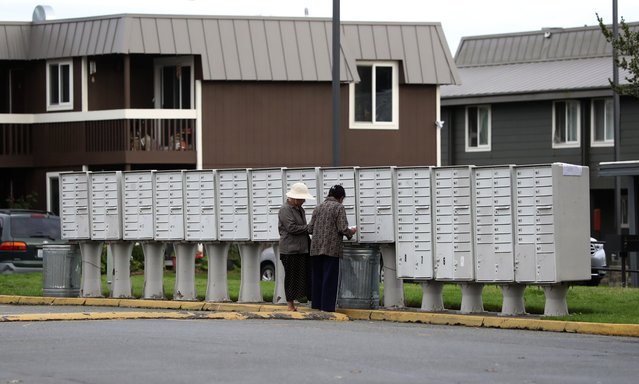Microsoft, King County and the King County Housing Authority will invest $245 million to provide affordable rents for more than 3,000 low- and middle-income residents through the purchase of five apartment complexes.
King County housing authority will buy apartment complexes in Kirkland, Bellevue and Federal Way to ensure that the residents aren’t faced with skyrocketing rental costs seen across the region, the organizations announced Thursday morning. Housing advocates say they chose the complexes – with 1,029 total units – because they were especially vulnerable to rental hikes or redevelopment based on their proximity to transit hubs and booming real estate markets.
The funding includes $60 million loaned to the housing authority from Microsoft, $20 million from King County and $140 million in bonds from the housing authority. The partnership is among the first originating from the Redmond tech giant’s $500 million pledge announced earlier this year to address homelessness and develop affordable housing throughout the region.
The pledge is the largest in the company’s 44-year history, and, according to the company, is one of the heftiest contributions by a private corporation to housing.
This project is part of Microsoft’s focus on the middle-income population, or those earning between $60,000 to $120,000 a year, said Jane Broom, senior director of Microsoft Philanthropies, and the company’s belief that communities should have people at all income levels and job categories, said Jane Broom, senior director of Microsoft Philanthropies. Microsoft said it would loan $225 million to help developers facing high land and construction costs build and preserve “workforce housing” on the Eastside.
The complexes are Kendall Ridge in Bellevue; Emerson, Juanita View and Kirkland Heights in Kirkland; and Riverstone in Federal Way. The residents currently living there will get to stay, regardless of their income level, said Dan Watson, deputy executive director of the King County Housing Authority. Based on their listed rents, the housing typically appeals to middle-income residents, he added.
Each complex offers “naturally occurring affordable housing,” because they are older and have fewer amenities than newer housing, but are particularly vulnerable to changes from private investors, Watson said. The current residents would likely not be able to afford the higher-end rents if the units were upgraded.
“Unfortunately what you’re seeing now is not just one unit, but whole communities being displaced,” Watson said. “This is a long-term effort to stabilize rents in communities where rents are rapidly rising, and fully expect to continue over the next 10 to 15 years.”
At the Riverstone Apartments in Federal Way, for example, rents start between $1,065 for a studio to $1815 for a three-bedroom, two-bathroom unit. The average rent in the South King County city is $1,380, according to a report from Apartment Insights/Real Data, which surveys landlords quarterly. The complex, built in the 1980s with 308 units, is close to the future Sound Transit light rail station on South 272nd Street.

The Kendall Ridge apartments in Bellevue range from $1,400 studios to $1,950 two-bedroom, two-bathroom unit. The 140-unit complex was chosen in part because of the rapidly rising rents throughout the Eastside and for its closeness to the Microsoft campus, Watson said.
“Certainly with employment growth in the region, and more particularly on the Eastside, it seems inevitable that they would increase at a higher pace than the incomes of the people living there,” Watson said.
With rents stabilized, the monthly rents could remain at up to $500 below the market rate of surrounding apartments, Watson said. Over 30 years, the amount paid by rents in total could be more than $450 million less than what they would have paid in units with market rents.
Microsoft’s pledge also includes $250 million for market-rate loans for construction of affordable housing for people earning up to 60 percent of the local median income, which is $48,150 for a two-person household. The remaining $25 million will be donated to services for low-income residents and people experiencing homelessness.
Source: seattletimes





